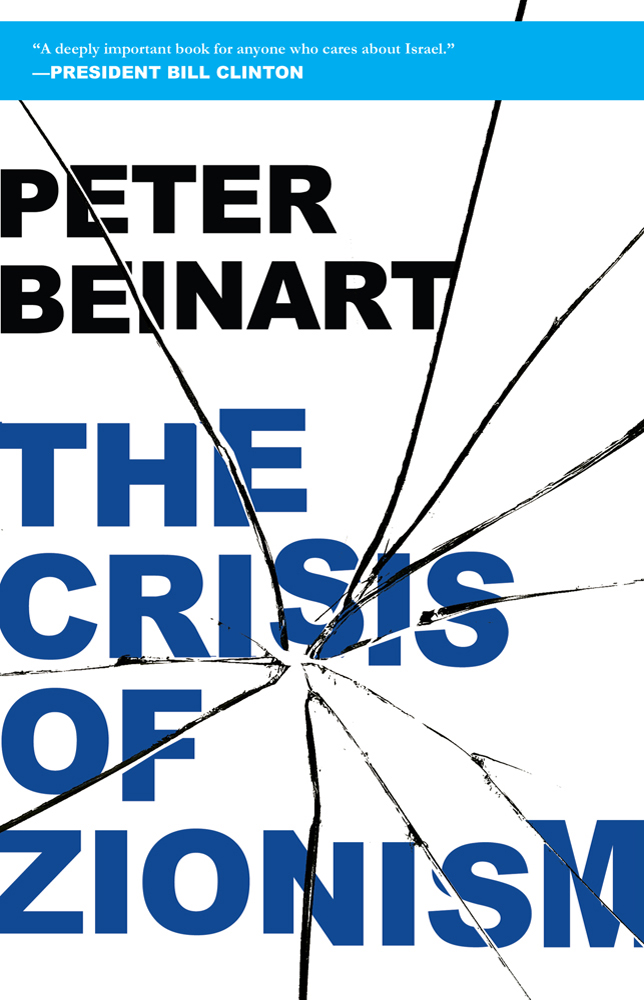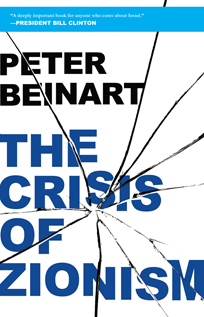What do Palestinian activists and a Jewish Zionist in Manhattan have in common? The opposition of Israeli hard-line conservatives, as it turns out. Peter Beinart, a former editor of The New Republic who now teaches at the City University of New York, argues that the future of Israel is in grave danger — not from the enemies that have long surrounded it, but from its growing extremism internally and the growing apathy of liberal American Jews toward Israel.
In his new book, The Crisis of Zionism, Beinart makes the case that the dream of a democratic Israel is dying, undermined by West Bank settlements and the marginalization of Palestinians. Within the United States, Israel’s longtime ally, Zionist organizations reflexively support Israel’s policies, while liberal Jews have a fading interest in Israeli issues. In both countries, there has been no significant opposition from liberal Zionists to the bellicose policies that endanger Israel’s founding principles of democracy.
Beinart fears the end of the two-state solution that would grant Palestinians and Jews their own nations, believing that the two groups could not live together harmoniously in one state after decades of acrimony. Breaking with many of his fellow Zionists, however, he identifies Jewish settlements in the proposed Palestinian nation as the greatest threat to this goal. “There are, to be sure, many Palestinians who don’t want two states and seek Israel’s destruction,” he writes. “But the best way to ensure their triumph is to keep eating away at the land on which a Palestinian state may be born.”
Democracy’s Demise
Zionism, a term that entered the lexicon in the late nineteenth century, has manifested itself in many forms — from the Revisionist Zionism of secular nationalists, to Religious Zionism and leftist Labor Zionism. What ties together these diverse movements is the belief that, after millennia of living in communities dispersed across the globe, Jews should have their own state in their traditional homeland.
What generates interest in Beinart’s book is that deep reservations about Israeli policy are coming from someone with unassailable credentials as a Zionist. The son of Jewish immigrants, Beinart once edited the pro-Israel New Republic and still attends an Orthodox synagogue. In Crisis, he calls for nothing as radical as the loss of Israel’s Jewish identity or the withdrawal of U.S. support. In fact, the preservation of the Zionist state, presumably with a close relationship to Washington, is what Beinart seeks to secure. However, he is also searching for a way to reconcile his Zionism with his liberal humanitarianism, which — as things stand currently — he finds in direct opposition.
On the one hand, Beinart praises Israel’s ability to maintain its democratic character — at least within its pre-1967 borders — despite wars and rumors of war. He rejects objections to Zionism itself as incompatible with democracy. And while he hopefully cites statements by Arab leaders, particularly Hamas, indicating a moderating of their views towards the Jewish state, he does not insist that they be accepted at face value.
On the other hand, Beinart admits to having ignored or justified Palestinian suffering for much of his career. This changed, Beinart recounts early in the book, when he watched video footage of a Palestinian man in the West Bank being hauled away for stealing water despite the frantic cries of his child. Beinart explains that Palestinians have much less access to water than Israelis in the occupied territories, and are far more likely to be arrested for similar offenses.
His change of heart has led Beinart to a more balanced view of the conflict. “As a Zionist, I believe that after two millennia of homelessness, the Jewish people deserve a state dedicated to their protection in their historic land … As a partisan of liberal democracy, I believe that to honor that history of suffering, a Jewish state must offer equal citizenship to all its inhabitants,” he writes.
Stated in this way, Beinart’s view would seem palatable to many in both the U.S. and Israel. But as he goes on, it quickly becomes apparent how out of step such opinions have become in both countries. Beinart cites polls showing that seventy percent of Jewish Israelis oppose appointing Arab Israelis to cabinet posts, even though the country is one-fifth Arab. Deputy Prime Minister Avigdor Lieberman has risen to prominence despite (or rather because of) his calls for loyalty oaths and the redrawing of Israel’s borders to “reflect demographic realities” — even if that means disenfranchising the Palestinians.
In the U.S., the majority of Jewish voters are liberal, consistently supporting Democrats such as Barack Obama for president. And yet the debate in America is even more one-sided: an older community of Jewish activists, exemplified by Anti-Defamation League national director and Holocaust survivor Abraham Foxman, instinctively supports Israel’s government. As Obama has learned, this assertive interest group can severely hinder even the most charismatic politician’s fundraising if he refuses to toe the line. Meanwhile, a younger community of Jewish voters fails to offer a political counterweight to their elders. Having grown up in a prosperous country where Jews are held in high regard, they do not prioritize Israeli issues. “For the most part, young Jews are not redefining American Zionism,” Beinart writes. “They are abandoning American Zionism.”
The older intransigents are dying out. Yet Beinart is not hopeful: the mantle will not be taken up by liberal Zionists, he says, but by young Orthodox Jews, the vast majority of whom oppose a Palestinian state.
Reading this book, one may wonder if any prominent liberal Zionists, aside from Beinart, still exist. The late Israeli Prime Minister Yitzhak Rabin pursued peace with Palestine and made progress through the Oslo Accords, but his reward was to be slain by a Zionist extremist outside a peace rally.
Obama is held up by Beinart as a disciple of liberal Jewish leaders, and one of the few American politicians willing to speak of Palestinian suffering. But the hostile reaction to Obama’s 2011 speech on upholding the 1967 borders, and the president’s subsequent retreat from that stance, indicate that there are limits to how hard he will fight for this ideal. In his chapter on Obama’s humbling at the hands of Prime Minister Benjamin Netanyahu and the other hawks who now lead Israel, Beinart concludes with the sad tale of America’s president seemingly pleading with liberal voters to “make” him push for peace once again.
“When Obama, a Democratic president genuinely committed to ending the occupation [of Palestine], ends up capitulating to an Israeli prime minister whom many Democrats privately loathe, it is hard to imagine any American president significantly challenging Israeli behavior anytime soon,” Beinart writes. He adds that Obama’s call to action has not been taken up. How could it be? Beinart all but tells us that the movement that would act on such a pledge cannot be rallied. It no longer exists.
No Time for Peace
Worse yet, it may already be too late to bring about the truly democratic, Jewish Israel that Beinart desires. One of his “solutions” is a standard idea for creating new movements: education. Specifically, he wants liberal American Jews to send their children to Jewish schools so that the next generation grows up invested in its cultural identity and committed to liberal Zionist ideals. But even if this happened, how long would it take to foster a generation of Zionists sympathetic to the Palestinians’ plight? Within a generation, metastasizing settlements and demographic shifts that portend an eventual Arab Israeli majority may make a two-state solution impossible — assuming it is not already.
Beinart’s other proposal is to target boycotts and sanctions strictly at Israeli settlements — what he calls “non-democratic Israel” — thus avoiding the “ambiguity” of the current campaigns in many countries to disinvest from Israel in its entirety. This approach is a novel one, but as others have pointed out, it arrives at too late a date. In the years following the Rabin assassination, economic pressure might have been meaningful. Now, about 500,000 Israeli settlers are living on Palestinian land. If the Israeli government has finally found its peace partner in the Palestinian Authority, polling suggests that the number of Palestinians willing to accept a two-state solution is dropping.
And then there is Iran. By many accounts, Netanyahu’s government is readying itself for armed conflict with Iran over a nuclear program that has not, as of yet, produced any weapons. War between the two countries would inflame tensions throughout the entire Middle East, likely uniting the Arab world — the Palestinians included — against the U.S. and Israel. It would also risk the anger of much of the non-Arab world, who might turn on the two allies if Israel was seen as the aggressor and the loss of Iranian oil crippled an already fragile global economy. Even though the Israeli government’s efforts to stop Iran’s nuclear program have received far more press coverage than its problems with the Palestinians as of late, Beinart refers to Iran only once in his book.
The Crisis of Zionism provides a lucid and inspired explanation of how Israel and the U.S. arrived at this deadly impasse over the fate of the occupied territories. As a committed Zionist, Beinart intends to salvage the two-state solution, not document its demise. But his solutions fall short, and his hopefulness seems misplaced. The way the peace process is headed, Beinart’s next project may be articulating something much more drastic: what Zionists, both liberal and Orthodox, should do if the two-state solution is dead.
Rob York Rob York works for a think tank in Honolulu and still prefers communication by Post-it Notes.
- Follow us on Twitter: @inthefray
- Comment on stories or like us on Facebook
- Subscribe to our free email newsletter
- Send us your writing, photography, or artwork
- Republish our Creative Commons-licensed content


